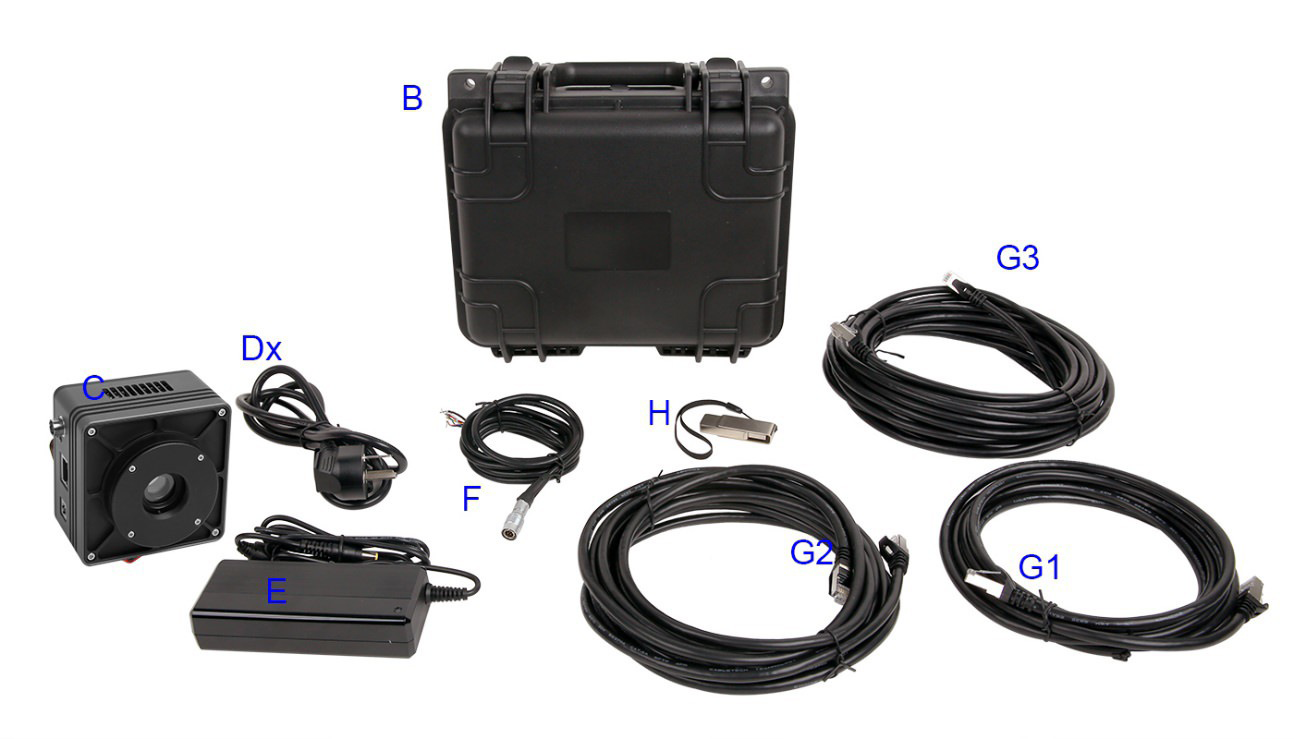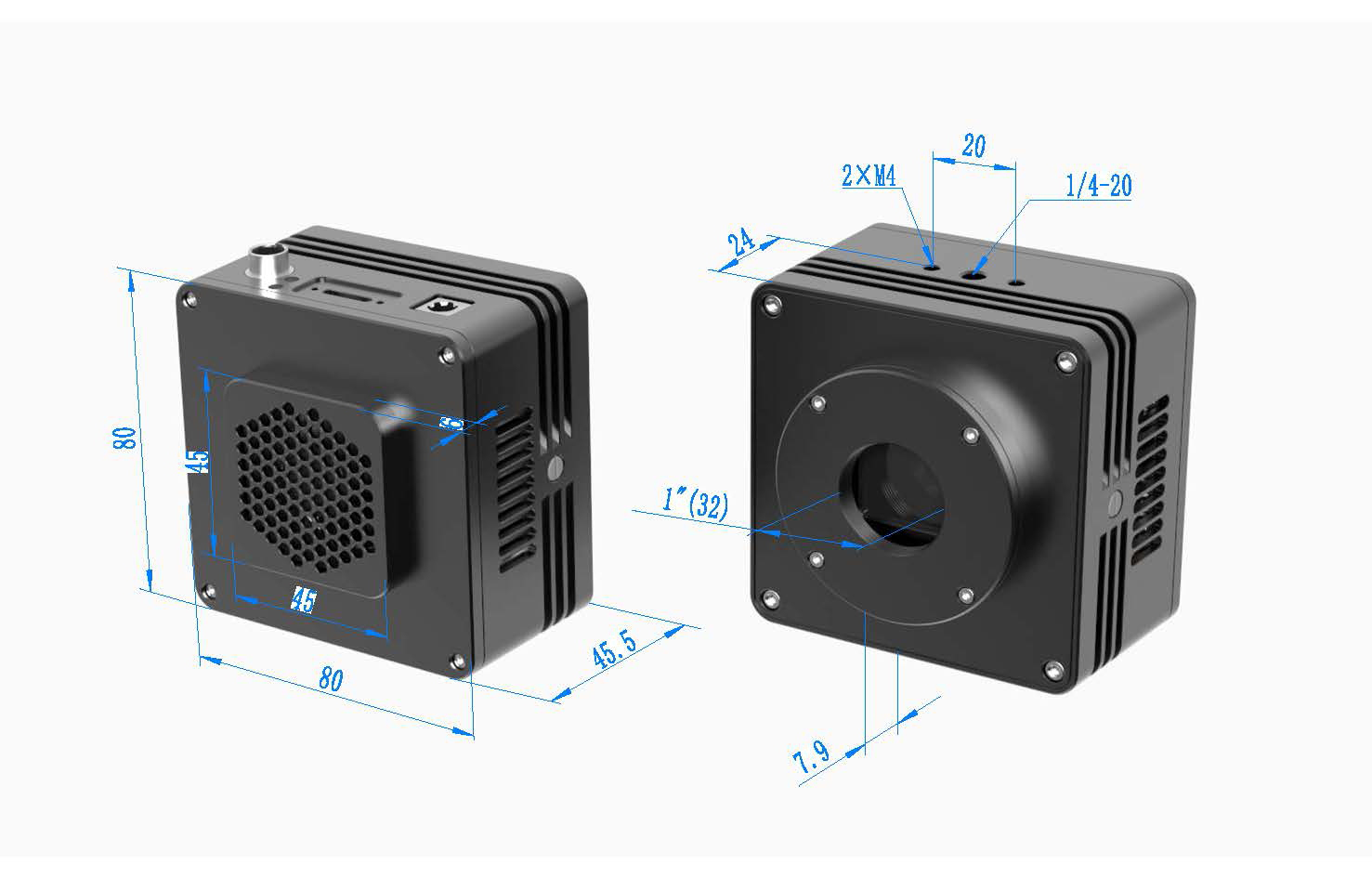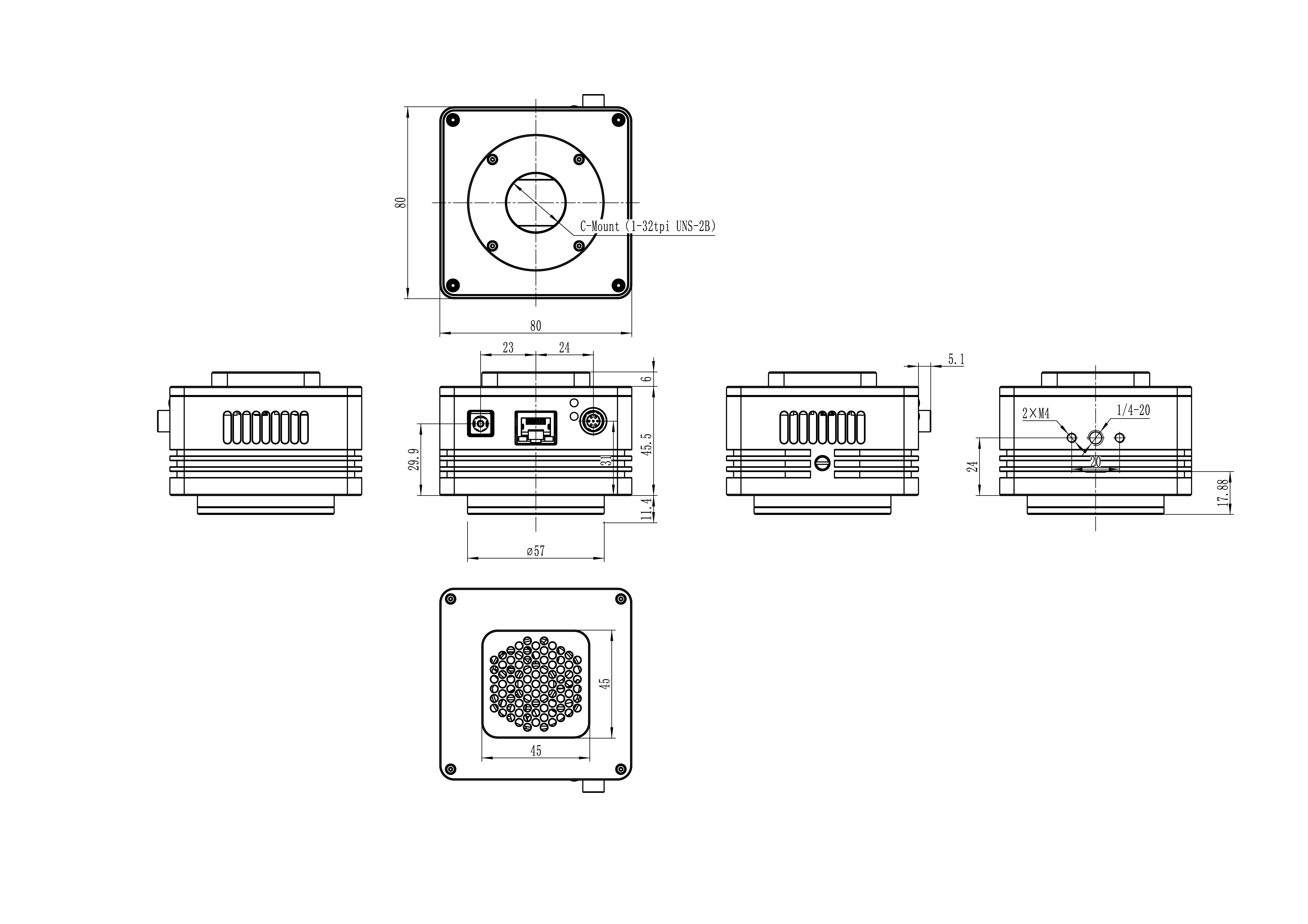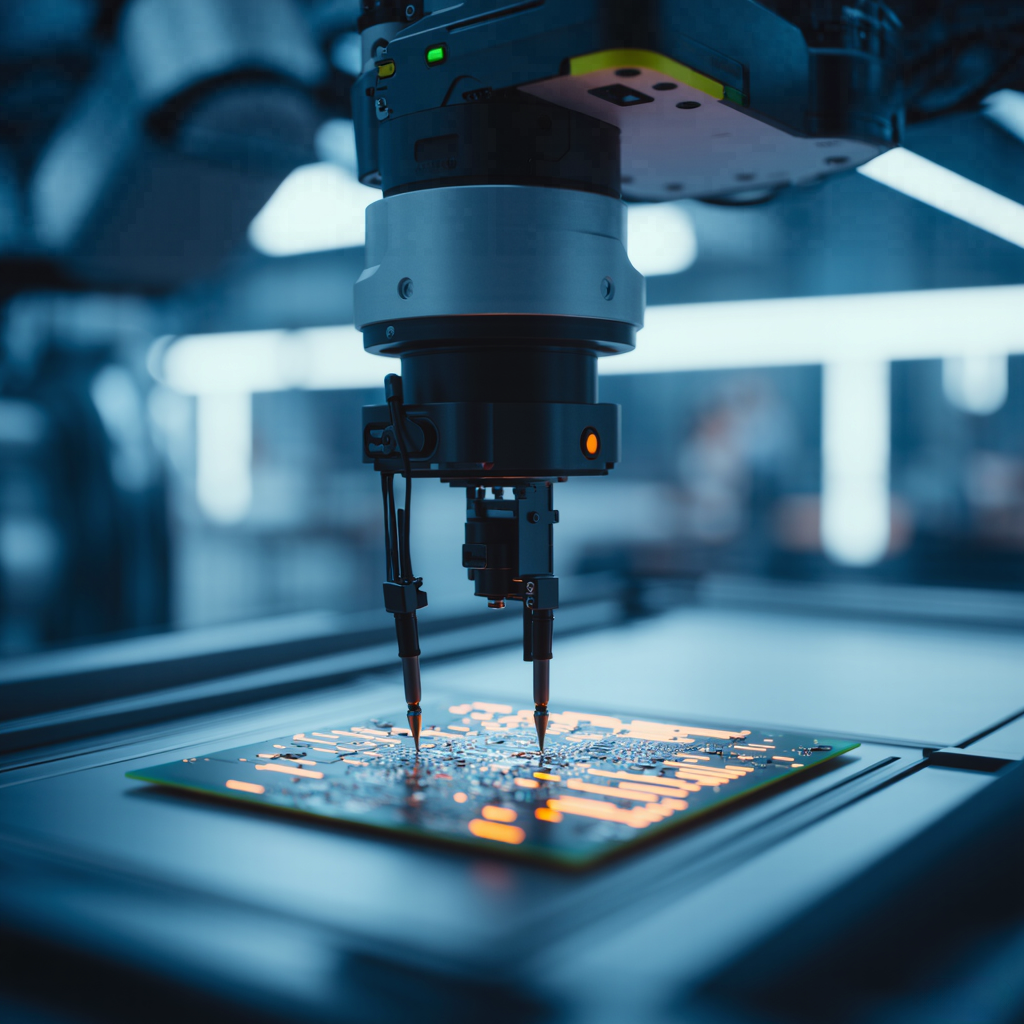CTR3CMOS Series
Product Introduction
The CTR3CMOS series is designed for low-light and long-exposure scenarios, featuring Sony Exmor and other high-performance CMOS sensors with resolution coverage from 0.39–20 MP and sensor formats from 1/2.9″–4/3″. Built-in thermoelectric cooling (TEC) and closed-loop temperature control reduce sensor operating temperature by approximately 5–10 °C below ambient temperature. Combined with anti-fogging structure, it effectively suppresses dark current and condensation, ensuring imaging stability and consistency during low-temperature, long-duration acquisition.
Data links support USB3.0 (5 Gbit/s) and GigE (1 Gbit/s, model dependent), maintaining stable throughput under high-speed/long-distance transmission. Supports 8/12/16-bit data output (model dependent), ROI/windowing and multi-gain modes. Cameras provide free-running, software/hardware triggering and multi-camera synchronization, with industrial-grade I/O for integration with external light sources, motion platforms or production line signals. Maximum exposure can reach approximately 300 s, suitable for chemiluminescence, fluorescence, spectroscopy and other weak signal applications.
Includes ToupView software and provides cross-platform SDK (Windows / Linux / macOS) for secondary development and system integration, meeting diverse requirements for scientific research, industrial inspection and general scientific imaging.
Product Features
- High-sensitivity low-noise CMOS (Sony Exmor and others, model dependent), covering visible/NIR applications
- Thermoelectric TEC cooling: typical ΔT ≈ 5–10 °C (below ambient), significantly reducing dark current
- Closed-loop temperature control and temperature setting/locking, balancing low noise with quantum efficiency (QE) maintenance
- Anti-fogging optical structure, suppressing window/sensor condensation during low-temperature and long-exposure conditions
- Resolution coverage 0.39–20 MP, sensor formats 1/2.9″–4/3″ (model dependent)
- Bit depth output: 8 / 12 / 16-bit (model dependent), enhancing weak signal gradation and dynamic range
- Maximum exposure approximately 300 s (model dependent), suitable for extremely low-light/low illumination imaging
- Data interfaces: USB3.0 (5 Gbit/s) / GigE (1 Gbit/s, model dependent), stable long-distance transmission
- Acquisition modes: free-running, software trigger, external hardware trigger; supports multi-camera synchronization and strobe control
- Image functions: ROI/windowing, digital binning, mirroring, Gamma/LUT, multi-gain modes (model dependent)
- Industrial-grade I/O: optically isolated trigger input/strobe output and programmable GPIO (model dependent)
- Optional optical windows: IR-CUT / dual AR coating (model and application dependent)
- Metal (aluminum alloy) CNC housing with electromagnetic shielding and heat dissipation optimization, suitable for long-term stable operation
- Software and ecosystem: includes ToupView; provides Windows / Linux / macOS SDK, compatible with common third-party interfaces
- Typical applications: chemiluminescence/fluorescence microscopy, spectroscopy/low-light detection, materials/semiconductor analysis, etc.
Product Models
CTR3CMOS | TEC Cooling (ΔT≈5–10 °C) | 0.39–20 MP, 1/2.9″–4/3″ | USB3.0 / GigE | Long Exposure up to 300 s
| Model | Sensor / Size | Resolution | Pixel Size | Shutter | Frame Rate | Interface | Color | Action |
|---|---|---|---|---|---|---|---|---|
| CTR3CMOS00390KMA |
Sony IMX287LLR
1/2.5" (6.21 mm) | 4.97 mm × 3.73 mm
|
0.39MP (720×540) | 6.9 µm × 6.9 µm | Global Shutter |
20 fps@720×540
|
USB3.0 |
|
View Details |
| CTR3CMOS00503KMA |
Sony IMX426LLJ
1/1.8" (9.11 mm) | 7.2 mm × 5.58 mm
|
0.5MP (800×620) | 9.0 µm × 9.0 µm | Global Shutter |
20 fps@800×620
|
USB3.0 |
|
View Details |
| CTR3CMOS01700KPA |
Sony IMX432LQJ
1" (17.47 mm) | 14.4 mm × 9.9 mm
|
1.7MP (1600×1100) | 9.0 µm × 9.0 µm | Global Shutter |
98.6 fps@1600×1100
|
USB3.0 |
|
View Details |
| CTR3CMOS01700KPA-G |
Sony IMX432LQJ
1" (17.47 mm) | 14.4 mm × 9.9 mm
|
1.7MP (1600×1100) | 9.0 µm × 9.0 µm | Global Shutter |
66 fps@1600×1100
|
GigE |
|
View Details |
| CTR3CMOS01700KMA |
Sony IMX432LLJ
1" (17.47 mm) | 14.4 mm × 9.9 mm
|
1.7MP (1600×1100) | 9.0 µm × 9.0 µm | Global Shutter |
98.6 fps@1600×1100
|
USB3.0 |
|
View Details |
| CTR3CMOS01700KMA-G |
Sony IMX432LLJ
1" (17.47 mm) | 14.4 mm × 9.9 mm
|
1.7MP (1600×1100) | 9.0 µm × 9.0 µm | Global Shutter |
66 fps@1600×1100
|
GigE |
|
View Details |
| CTR3CMOS07100KPA |
Sony IMX428LQJ
1" (17.47 mm) | 14.4 mm × 9.9 mm
|
7.1MP (3200×2200) | 4.5 µm × 4.5 µm | Global Shutter |
51.3 fps@3200×2200
133.8 fps@1584×1100
|
USB3.0 |
|
View Details |
| CTR3CMOS07100KPA-G |
Sony IMX428LQJ
1" (17.47 mm) | 14.4 mm × 9.9 mm
|
7.1MP (3200×2200) | 4.5 µm × 4.5 µm | Global Shutter |
16.4 fps@3200×2200
66 fps@1600×1100
|
GigE |
|
View Details |
| CTR3CMOS07100KMA |
Sony IMX428LLJ
1" (17.47 mm) | 14.4 mm × 9.9 mm
|
7.1MP (3200×2200) | 4.5 µm × 4.5 µm | Global Shutter |
51.3 fps@3200×2200
133.8 fps@1584×1100
|
USB3.0 |
|
View Details |
| CTR3CMOS07100KMA-G |
Sony IMX428LLJ
1" (17.47 mm) | 14.4 mm × 9.9 mm
|
7.1MP (3200×2200) | 4.5 µm × 4.5 µm | Global Shutter |
16.4 fps@3200×2200
66 fps@1600×1100
|
GigE |
|
View Details |
| CTR3CMOS08300KMA |
Sony IMX585
1/1.2" (12.78 mm) | 11.14 mm × 6.26 mm
|
8.3MP (3840×2160) | 2.9 µm × 2.9 µm | Rolling Shutter |
45 fps@3840×2160
70 fps@1920×1080
|
USB3.0 |
|
View Details |
| CTR3CMOS20000KPA |
Sony IMX183CQK
1" (15.72 mm) | 13.056 mm × 8.755 mm
|
20MP (5440×3648) | 2.4 µm × 2.4 µm | Rolling Shutter |
19.0 fps@5440×3648
48.8 fps@2736×1824
59.4 fps@1824×1216
|
USB3.0 |
|
View Details |
| CTR3CMOS20000KPA-G |
Sony IMX183CQK
1" (15.72 mm) | 13.056 mm × 8.755 mm
|
20MP (5440×3648) | 2.4 µm × 2.4 µm | Rolling Shutter |
4.5 fps@5440×3648
18.5 fps@2736×1824
41.7 fps@1824×1216
|
GigE |
|
View Details |
| CTR3CMOS20000KMA |
Sony IMX183CLK
1" (15.72 mm) | 13.056 mm × 8.755 mm
|
20MP (5440×3648) | 2.4 µm × 2.4 µm | Rolling Shutter |
19.0 fps@5440×3648
48.8 fps@2736×1824
59.5 fps@1824×1216
|
USB3.0 |
|
View Details |
| CTR3CMOS20000KMA-G |
Sony IMX183CLK
1" (15.72 mm) | 13.056 mm × 8.755 mm
|
20MP (5440×3648) | 2.4 µm × 2.4 µm | Rolling Shutter |
4.5 fps@5440×3648
18.5 fps@2736×1824
41.7 fps@1824×1216
|
GigE |
|
View Details |
| CTR3CMOS45000KMA |
Sony IMX492LLJ-C
4/3" (22.96 mm) | 18.93 mm × 13.00 mm
|
45MP (8176×5616) | 2.315 µm × 2.315 µm | Rolling Shutter |
8.1 fps@8176×5616
30.0 fps@4080×2808
8.1 fps@7408×5556
33.0 fps@3696×2778
10.4 fps@8176×4320
34.7 fps@4096×2160
62.5 fps@2048×1080
86.5 fps@1360×720
|
USB3.0 |
|
View Details |
Packing List #
CTR3CMOS cooled machine vision cameras (USB3 / GigE · -10 °C TEC) standard kit and packing information
Recommended kit
- Camera body (CTR3CMOS USB3)
- Power adapter: input AC 100~240 V 50/60 Hz; output DC 12 V 3 A
- I/O cable: 7-pin cable or extension
- Micro USB 3.0 cable
- Lens (optional) C-mount
Recommended kit
- Camera body (CTR3CMOS GigE)
- Power adapter: input AC 100~240 V 50/60 Hz; output DC 12 V 3 A
- I/O cable: 7-pin cable or extension
- GigE network cable
- Lens (optional) C-mount
Product Dimensions #
CTR3CMOS cooled machine vision camera dimension overview
Deep Product Overview
Stable single-stage TEC cooling
Uses single-stage thermoelectric cooling that typically drops the sensor temperature about 10 °C below ambient, effectively suppressing dark current and improving long-exposure stability. Precise temperature control with anti-condensation design keeps it running reliably across environments, ideal for low-light imaging and unattended research observations.
High-performance backside-illuminated sensor
Equipped with Sony backside-illuminated CMOS sensors that deliver very high quantum efficiency and ultra-low read noise. Dual-gain modes and optimized electronics bring read noise down to 1 e⁻, preserving image quality in low light or long exposures. Pixel sizes from 2.4 µm to 4.63 µm balance high resolution with high sensitivity, giving a strong foundation for weak-signal capture.
Professional-grade imaging assurance
Supports 8-bit/12-bit output; 12-bit depth supplies ample gradation for research analysis. Typical dynamic range reaches 75 dB with SNR above 50 dB, meeting high-contrast scientific imaging needs. Flexible exposure control from 50 µs to several hours captures both fast events and deep-sky long exposures. The USB3.0 interface and large onboard buffer ensure stable delivery of high-resolution frames.
High-reliability industrial design
CNC metal housing with efficient thermal management keeps temperatures stable during long runs. The anti-condensation window prevents frosting at low temperatures, while the all-metal body offers strong electromagnetic shielding to reduce interference. Operating range is -10 to 50 °C, supporting long-term stability for around-the-clock research observations.
Complete software ecosystem support
SDKs are available for Windows, Linux, and macOS, supporting C/C++, Python, and other mainstream languages for fast integration into existing research systems. Standardized interfaces and complete documentation make it easy to embed the camera into telescopes, spectrometers, microscopes, and other scientific equipment. The single-cable USB3.0 power design simplifies deployment, with optional 12 V auxiliary power for even steadier cooling.














